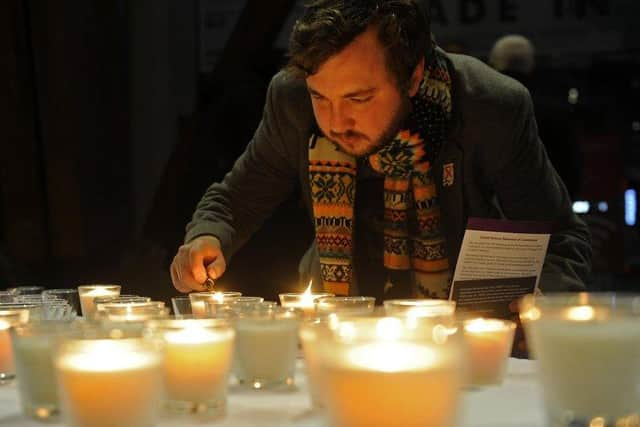Holocaust Memorial Day: Sheffield holds one-minute silence in honour of victims and survivors of genocides
and live on Freeview channel 276
The vigil, which was hosted by Sheffield City Council and streamed online from 5.45pm, commemorated the millions of people who were killed in the Holocaust and subsequent genocides in Cambodia, Rwanda, Bosnia and Darfur.
January 27 also marks the anniversary of the liberation of Auschwitz II-Birkenau, the largest Nazi death camp.
Advertisement
Hide AdAdvertisement
Hide AdThe vigil featured words from Gail Smith, Lord Mayor of Sheffield, and Councillor Terry Fox, the council's leader. This year's theme was 'One Day,' which expresses the hope that such horrors will never happen again.


Coun Smith, in her speech, said Sheffield will continue to raise awareness of the Holocaust and other genocides, as the ‘dreadful and inhumane act should never be forgotten’.
She added: "Sheffield is the first city of sanctuary in the UK, and we should feel incredibly proud of those who call this welcoming city their home.
"We are truly committed to supporting those who had no choice but to flee their homes, thousands of miles away, to rebuild their lives here and be with us today."
‘Stand up to all injustice’
Advertisement
Hide AdAdvertisement
Hide AdCoun Fox said the ‘One Day’ theme was ‘thought-provoking, inspirational and reflective’, as it was ‘relevant to some aspect of our lives’.
He said: "We are here today to renew our commitment in remembrance of the victims who faced unimaginable assaults and atrocities committed in the name of identity-based prejudice.
"As we move forward to 2022, resilience, determination, and solidarity should continue to protect those who are vulnerable and celebrate our differences.
"We also need to stand up to all injustice, and one day, the world will be a better place for all of us."
Advertisement
Hide AdAdvertisement
Hide AdMuneerah Al-Yafai, from Sheffield Council Youth Cabinet, also called for people to do their part and stand up against all kinds of injustice and racism.
She said: "The evil that was perpetrated in the event of the Holocaust was not created overnight; it was created following years of racism that started subliminally.
"We must learn from this; we need to be mindful of all unspeakable crimes that started with a tiny action, with a whisper, with a name being called, propaganda and eventually genocide.
"Call the racists out; report hate crimes; teach our children. It is our duty as human beings to stop this hate."
Advertisement
Hide AdAdvertisement
Hide AdThe vigil, which ended just before 7pm, was also attended by Reverend David Busse from The Church of God of Prophecy, and Howard Saffer from Sheffield Jewish Reform Community, and it featured a recorded speech by Rabbi Yonosan Golomb from United Synagogue Sheffield.
More than 1.1 million people killed at Nazi camp during World War II
Neale Gibson Abo Anber, LGBT Sheffield secretary and Val Bowen, of Disability Sheffield, were also present.
The annual event is normally held in the Peace Gardens and Winter Garden in the city centre but the Covid-19 pandemic has seen the event move online.
When 46 countries signed the Stockholm Declaration in 2000, the UK played a key role in establishing HMD as an international day of memorial.
Advertisement
Hide AdAdvertisement
Hide AdThe largest Nazi extermination camp, Auschwitz-Birkenau, was liberated by the Soviets in 1945, located west of Krakow in Poland.
During World War II, an estimated 1.1 million people were killed at Auschwitz and Auschwitz II-Birkenau.
